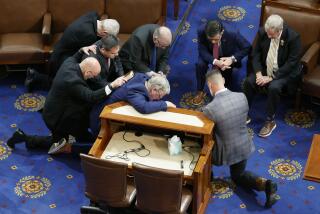Christian Coalition Names 2 Officials to Replace Reed
WASHINGTON — Underlining the challenge of replacing Ralph Reed as the leader of the Christian Coalition, founder Pat Robertson announced Wednesday that two men will try to fill Reed’s shoes.
Donald P. Hodel, who served as secretary of both the Interior and Energy departments in the Reagan administration, will become the group’s president.
Former Rep. Randy Tate (R-Wash.) will take Reed’s old slot as executive director.
Robertson, who started the coalition in the aftermath of his failed bid for the 1988 Republican presidential nomination, moves up from president to become chairman of the board.
Robertson said Hodel will have overall management responsibility for the organization whereas Tate will concentrate on political organization and leadership. Both will serve as spokesmen for the group.
Under the guidance of Reed, who is leaving to become a campaign consultant, the coalition emerged as one of the major forces in conservative politics.
It has about 1.8 million members and received more than $20 million in donations in 1996.
Hodel, 62, praised Reed’s leadership and pledged to pursue similar goals.
“Today we have what we have always sought--an influential role in the public debate,” said Hodel, who has been running an energy consulting firm. “We will use our voice to speak out for the family, for children and for the return of common-sense values.”
Tate, 31, was a leader among the conservative GOP freshmen representatives swept into office in 1994. But he was also among those who failed to win reelection last fall.
Tate said his service on Capitol Hill convinced him “more than ever that the real answers to America’s problems are not found in [Washington], but in the homes, neighborhoods and churches of our nation.”
Initially, the new leadership will have to deal with a serious legal problem left over from the Reed era--a Federal Election Commission lawsuit charging that the coalition violated tax regulations by spending funds to boost GOP candidates.
The group’s tax-exempt status hinges on its claim of nonpartisanship.
More to Read
Get the L.A. Times Politics newsletter
Deeply reported insights into legislation, politics and policy from Sacramento, Washington and beyond. In your inbox three times per week.
You may occasionally receive promotional content from the Los Angeles Times.










